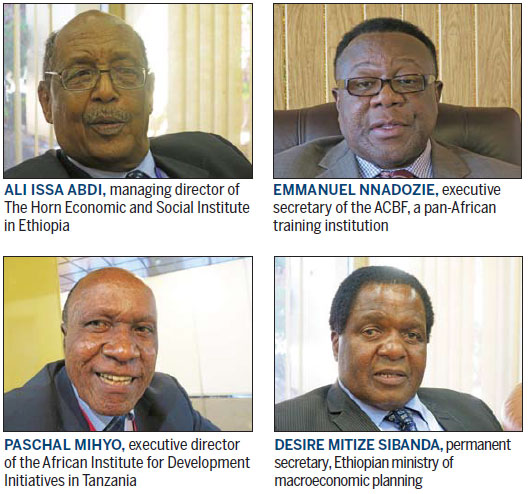Skills gap a big challenge for Africa
Continent should work with China to train and retain professionals and workers, delegates to Harare conference say
China's engagement with Africa puts it in a strategic position to assist the continent in shoring up its human resources to meet development goals.
But gaps in the number of experts, engineers, researchers and scientists needed remains dire. The continent's current share of global engineers stands at 35 per 1 million people, according to the African Capacity Building Foundation. This compares to 168 for Brazil, 2,457 for the European Union and 4,103 for the United States. Global engineers are those trained to perform effectively in a global context.

The continent has only 2 percent of the world's doctors, though it bears around 24 percent of the global burden of diseases. Only 28 percent of students in Africa are enrolled in science and technology.
The ACBF, a pan-African training institution, wants to change that. During a three-day conference in Harare, Zimbabwe, Emmanuel Nnadozie, the executive secretary, says Africa does not need to reinvent the wheel but invest in what is working. Some 300 delegates from sub-Saharan Africa attended. "This is one of the lessons we learn from China's meteoric ascent to economic success. They also didn't let their prevailing challenges deter them from achieving their ambitious goals. This is what Africa needs to do," Nnadozie says.
Drawing some lessons from China, Nnadozie's organization has developed a five-year strategic plan, from 2017 through 2021, that urges governments to invest heavily in science, technology, engineering, mathematics and vocational skills.
In its evaluation of Africa's need for critical technical skills, the ACBF says the continent needs 1.9 million scientists and researchers to achieve food security and 3.6 million water and sanitation engineers.
During the meeting of the Forum on China-Africa Cooperation in South Africa last year, President Xi Jinping pledged to invest $60 billion in Africa's development, and a 10-plan strategy was proposed. It included agriculture modernization, infrastructure, and public health among others. Five transport universities are to be established. It spells out plans to build joint research centers in areas such as agricultural science and technology and conduct training, together with building and equipping vocational institutions.
"We have already seen a number of programs in Kenya coming up through a joint collaboration between Egerton University and Jomo Kenyatta University of Agriculture and Technology and Chinese universities," Nnadozie says.
Ali Issa Abdi, managing director of The Horn Economic and Social Policy Institute based in Addis Ababa, Ethiopia, says China's contribution in building Africa's capacity is often overlooked.
"We are witnessing capacity-building initiatives taking place alongside Chinese-led projects. Besides meaningful employment, these firms have launched skills transfer programs and social responsibility projects in partnership with our government," Abdi says.
"Our vision to industrialize is actualized by the development of special economic zones designed and implemented by Chinese firms. This has definitely created learning opportunities for our youthful population," he says.
Abdi says Chinese firms are helping to bring in modern infrastructure such as a light rail train in Addis Ababa. "Modern infrastructure has improved the quality of life and acts as an incentive to dissuade professionals from seeking opportunities abroad. Brain drain is another key challenge in Africa, and we need strategies ensure that we train and retain people."
In 2011, over 10,000 medical graduates trained in Africa migrated and were registered to practice in the US, according to the ACBF.
"I think the issue of migration, both within and outside Africa, is one of the new challenges facing the ACBF in its second 25 years," says Timothy Shaw, a research professor from the University of Massachusetts in the US. He also believes that Africa's governments need friendly policies to build an amiable working relationship with the private sector, where a majority of African and Chinese entrepreneurs operate.
The Chinese moving to the continent import new forms of finance and ideas, Shaw says. "Chinese work ethics can rub off easily onto the local workers and in the process boost productivity and revenue collection."
In Zimbabwe, where estimates from 2012 indicate more than 10,000 Chinese entrepreneurs have settled, a good working relationship exists.
Desire Mitize Sibanda, permanent secretary of the Ministry of Macro-Economic Planning and Investment Promotion in Ethiopia, says: "We are working well with China and looking forward to developing bankable projects that we can partner with together. In this regard, I think the $60 billion pledged by China during FOCAC should be directed toward projects that will also supplement and complement capacity-building initiatives."
African institutions of higher learning need to embrace such unconventional sources of knowledge for their survival, says Paschal Mihyo, executive director of the African Institute for Development Initiatives based in Dar es Salaam, Tanzania.
"We are looking for strategies of marrying academia and the business community so that challenges in the marketplace can be effectively solved through our graduates. Our universities need to closely collaborate with Chinese firms that are implementing new technologies in the infrastructure sector," he says.
lucymorangi@chinadaily.com.cn


















